Missouri, New Hampshire could become right-to-work states
JEFFERSON CITY, Mo. -- Newly bolstered Republican majorities are moving quickly in several states to diminish the power of organized labor with new laws prohibiting mandatory union fees in workplaces. So-called right-to-work laws could get votes today in the Missouri House and the New Hampshire Senate, an early step toward eventual passage in two states where new Republican governors have pledged to sign the measures into law. The Missouri proposal won initial House approval Wednesday...
JEFFERSON CITY, Mo. -- Newly bolstered Republican majorities are moving quickly in several states to diminish the power of organized labor with new laws prohibiting mandatory union fees in workplaces.
So-called right-to-work laws could get votes today in the Missouri House and the New Hampshire Senate, an early step toward eventual passage in two states where new Republican governors have pledged to sign the measures into law. The Missouri proposal won initial House approval Wednesday.
A similar law was enacted earlier this month by Kentucky Gov. Matt Bevin, Republican, after it sped through the newly elected GOP Legislature.
Here's a look at what's at stake in the right-to-work debate:
Union bargaining
Employees of a business can vote to join a union by a simple majority. When that happens, a union typically becomes the exclusive bargaining representative, meaning it covers all employees -- even those who didn't support it. In Missouri and some other states, a union can choose to negotiate a contract with an employer requiring all workers to pay fees to the union to help cover the cost of its representation.
In a right-to-work state, employees can't be required to pay union dues or fees. But unions that are the exclusive bargaining representative still must represent all employees, even those who don't pay.
Why is it called right to work?
Supporters contend people should have the right to work at a business without being required to pay union fees.
Opponents contend it's not fair if some employees don't pay the union yet still benefit from pay raises, health coverage and other things negotiated by the union.
A renewed trend
Most state right-to-work laws were passed in the first couple of decades after a new Republican-led Congress in 1947 enacted greater federal restrictions on union powers. The movement gained renewed momentum after the 2010 elections, when Republicans swept into control of many state Capitols.
In 2012, Indiana became the first state in more than a decade to enact right to work. Michigan passed it later that year, Wisconsin in 2015 and West Virginia in 2016. Kentucky's new law made it the 27th right to work state.
Why is this a partisan issue?
Right-to-work laws generally have more support among Republicans than Democrats, because unions traditionally have supported more Democratic than Republican candidates.
What is the effect on unions?
It's generally believed right-to-work laws can hurt union finances.
"The reason it's a priority (for Republicans) is because it destroys unions," said Paul Secunda, director of the Labor and Employment Law Program at Marquette University Law School in Wisconsin.
But the data isn't conclusive.
Figures from the U.S. Bureau of Labor Statistics show union membership in Indiana stood at 302,000 in 2011. That fell by 56,000 when right to work was enacted the following year but rebounded to 299,000 in 2014, before dipping again the next year.
At the United Steelworkers Local 1999 in Indianapolis, union leaders had feared a 40 percent membership drop from right to work. But five years later, it has lost no more than 70 of its roughly 3,000 members, said union president Chuck Jones.
"It hasn't had any financial hardship on us at all," Jones said.
In Michigan, total union membership remained virtually unchanged, dropping from 629,000 in 2012 before right-to-work was enacted to 621,000 in 2015, according to the bureau.
Missouri's next move
The 101-58 vote Wednesday in the Missouri House gave first-round approval to the right-to-work bill. A second House vote could come as soon today to send the measure to the Senate.
The House defeated a Democratic amendment that would have referred right-to-work to the statewide ballot, instead of sending it the governor's desk to become law.
But voters still could get a crack at the issue. Missouri AFL-CIO president Mike Louis has submitted several versions of a proposed initiative petition to the secretary of state's office that would reverse a right-to-work law. If the petition is approved for circulation, and enough signatures are collected, voters in 2018 could decide whether to adopt a constitutional amendment protecting workplace contracts requiring all employees to pay fees covering the costs of union representation.
Associated Press writer Summer Ballentine contributed to this report.
Follow David A. Lieb at: http://twitter.com/DavidALieb
Connect with the Southeast Missourian Newsroom:
For corrections to this story or other insights for the editor, click here. To submit a letter to the editor, click here. To learn about the Southeast Missourian’s AI Policy, click here.









